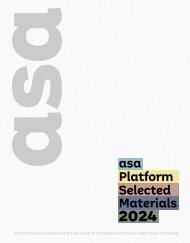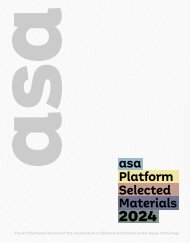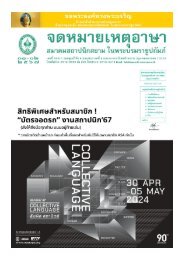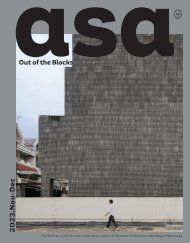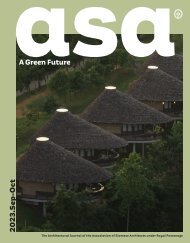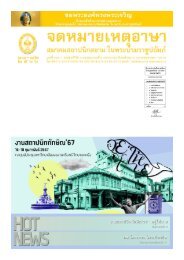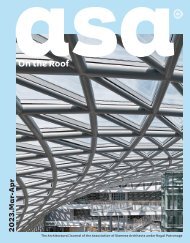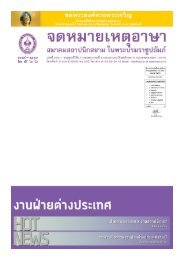บ้านเรือนถิ่นไทยในช่วงเจ็ดทศวรรษ 2489-2559
You also want an ePaper? Increase the reach of your titles
YUMPU automatically turns print PDFs into web optimized ePapers that Google loves.
การปล่อยสินเชื่อน้อยลงมากถึงแม้อัตราดอกเบี้ยจะ<br />
ต่ำลง และตัวเลขการลงทุนก็ชะลอตัวต่อไปอีกนาน<br />
ระบบการธนาคารทั้งหมดถูกปฏิรูปใหม่ การที่รัฐบาล<br />
ลุกขึ้นมาซื้อธนาคารที่กำลังจะล้มหรือล้มไปแล้วนั้น<br />
ทำให้สัดส่วนการลงทุนของภาครัฐในธุรกิจธนาคารเพิ่ม<br />
ขึ้นมาก ธนาคารที่ไม่ถูกซื้อมีการเปลี่ยนรูปแบบการ<br />
ดำเนินธุรกิจ ก่อนวิกฤติการณ์กฎหมายกำหนดให้<br />
ธนาคารพาณิชย์ที่มีสาขามากมายมีผู้ถือหุ้นเป็นคนไทย<br />
เท่านั้น แต่ความต้องการระดมเงินทุนทำให้ธนาคาร<br />
แห่งประเทศไทยจำเป็นต้องอนุญาตให้ธนาคารทุกแห่ง<br />
มีผู้ถือหุ้นต่างชาติได้ เมื่อเริ่มมีนายทุนต่างชาติ บวกกับ<br />
กฎระเบียบที่เข้มงวดขึ้นของธนาคารแห่งประเทศไทย<br />
ความสนิทสนมเป็นกันเองระหว่างธนาคารกับลูกค้า<br />
อย่างที่เคยปฏิบัติกันมาลดน้อยลงมาก เรียกได้ว่าระบบ<br />
การทำงานพัฒนาขึ้น (ทั้งสำหรับธนาคารและลูกค้า)<br />
แต่บทบาทการเป็นผู้จัดสรรเงินทุนและประสานงาน<br />
การลงทุนที่ธนาคารเคยทำกลับหายไป โดยธนาคาร<br />
เปลี่ยนบทบาทมาเป็นตลาดเงินทุนที่มีประสิทธิภาพ<br />
มากขึ้นแทน<br />
การบริหารเศรษฐกิจระดับมหภาคของประเทศมี<br />
to use the so-called market-driven approach,which was to<br />
leave these assets where they were, and let the banks<br />
nurse these assets back to health, hoping that this would<br />
yield better results. The alternative option was to carve out<br />
all the NPAs from all the financial institutions and warehouse<br />
them in a state-owned asset management company. The<br />
buying price would be the value of the collateral against<br />
the loans, which is of course substantially less than the<br />
face value of the loan. The banks selling these dud assets<br />
would then suddenly be capital short, which would be filled<br />
by capital injection from the government. Although there<br />
is a risk that warehousing the NPAs in a state-owned<br />
asset-management company would make them depreciate<br />
far more rapidly, there is, on the other hand, the possibility<br />
that the remaining “good banks”would function effectively<br />
right away, and thus assist in a faster recovery. 2 In the<br />
end, the Chuan government ruling at the time decided<br />
against this approach in favor of the market-oriented<br />
approach (Veerathai, 2003). By being cautious, the<br />
government slowed down the recovery of the financial<br />
การเปลี่ยนโฉมหน้าครั้งใหญ่ กลุ่มผู้เชี่ยวชาญรุ่นเก่าที่<br />
เคยทำหน้าที่ประสานแผนการเงินการคลัง อันทำให้<br />
นโยบายเศรษฐกิจโดยรวมของประเทศเป็นไปอย่าง<br />
สอดคล้องในระดับหนึ่งนั้นไม่มีอีกต่อไป พรรคการเมือง<br />
มีบทบาทมากขึ้นในการกำหนดนโยบายเศรษฐกิจ<br />
การบริหารเศรษฐกิจทั้งหมดในช่วงวิกฤติการณ์นั้นอยู่ใน<br />
มือของนายธาริน ส.ส.พรรคประชาธิปัตย์ผู้ดำรง<br />
ตำแหน่งรัฐมนตรีคลัง แต่ปรากฏว่าเขาหัวเก่ายิ่งกว่า<br />
กลุ่มผู้เชี่ยวชาญเดิมเสียอีก เพิ่งจะในยุคทักษิณนี่เองที่<br />
เราเริ่มเห็นแนวทางการบริหารเศรษฐกิจเชิงรุกแบบใหม่<br />
จากนักการเมือง ข้อดีหนึ่งของแผนการเงินการคลังแบบ<br />
อนุรักษ์นิยมเมื่อเกิดวิกฤติการณ์คืออัตราเงินเฟ้อที่ต่ำ<br />
หลังเหตุการณ์ค่าเงินบาทอ่อนตัวหลัง พ.ศ. 2540 ทำให้<br />
อัตราแลกเปลี่ยนเงินบาทที่แท้จริงตกลง 20 เปอร์เซ็นต์<br />
เมื่อเทียบกับก่อนหน้า พ.ศ. 2540 และนั่นทำให้ภาคการ<br />
ส่งออกขยายตัวมากขึ้นจนสูงถึง 70 เปอร์เซ็นต์ของ<br />
GDP ถึงแม้อัตราการสร้างมูลค่าเพิ่มในประเทศจะอยู่ที่<br />
30-35 เปอร์เซ็นต์ของ GDP แต่ก็ถือว่าเพิ่มขึ้นมากเมื่อ<br />
เทียบกับก่อนวิกฤติการณ์ (Chaipat และอื่นๆ 2552)<br />
ตั้งแต่นั้นเศรษฐกิจของไทยมีความเชื่อมโยงกับเศรษฐกิจ<br />
system and lengthened the economic depression. It entered<br />
the 2001 general elections with the economy below the<br />
pre-depression peak and was duly defeated.<br />
Because of the cautious policy on bank restructuring,<br />
and the consequent length and depth of the depression,<br />
the cost of the crisis was probably larger than it could have<br />
been. By 2002, when the losses from the support of the<br />
banks during the crisis were consolidated into the public<br />
debt, the debt-to-GDP ratio had jumped five-fold from the<br />
level before the crisis (Figure 1).<br />
Thai businesses took a severe punishment during the<br />
deleveraging process, and harsh lessons were learned.<br />
Afterward, they have shied away from over borrowing and<br />
relied more on their own cash flows, another reason why<br />
there has been little use of bank credit since then despite<br />
the low interest rate, and also for the low level of investment<br />
that prevailed for a very long time. This slow pace of<br />
investment relative to saving enabled Thailand to<br />
accumulate foreign exchange reserves continuously (despite<br />
the flexible exchange rate system), making Thailand a small<br />
104






